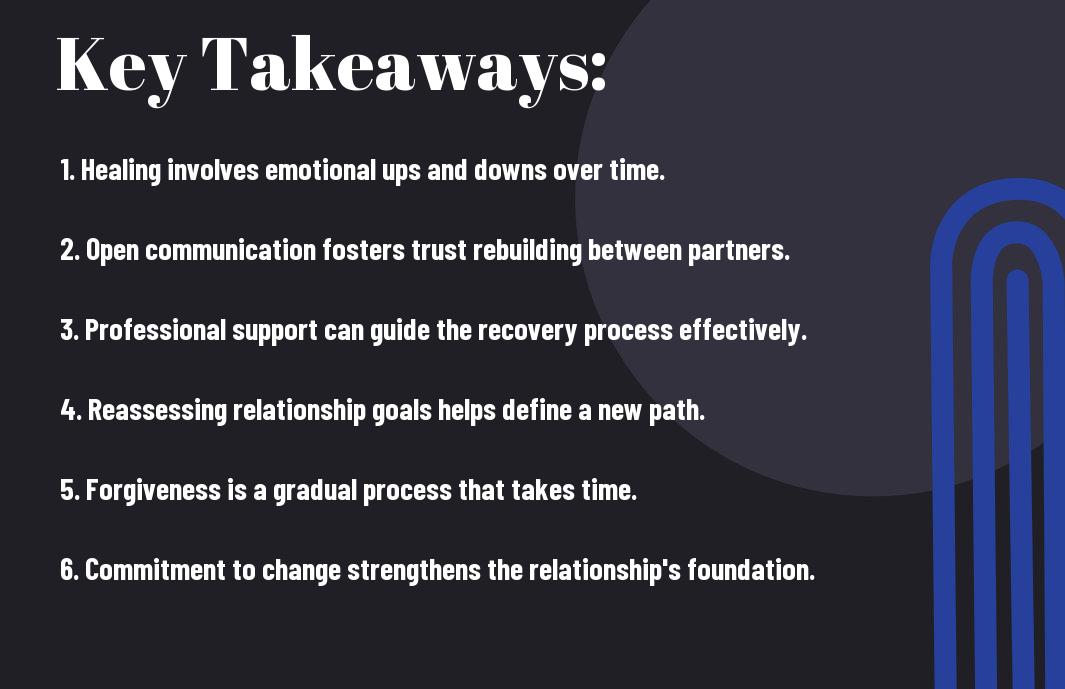With the complexities of affair recovery, understanding the various stages you will encounter can significantly impact your healing journey. You may find yourself experiencing a whirlwind of emotions, including pain and confusion, but acknowledging these feelings is imperative for your growth. Expect to navigate through phases of denial, anger, and ultimately forgiveness, each bringing unique challenges and opportunities for personal development. By anticipating these stages, you can cultivate resilience and foster healthier communication with your partner as you work toward rebuilding trust and intimacy.

Key Takeaways:
- Acknowledge the emotional turmoil: Understanding that both partners will experience a range of intense feelings is imperative to navigating recovery.
- Establish open communication: Honest discussions about the affair and feelings surrounding it are vital for rebuilding trust.
- Seek professional guidance: Therapy or counseling can provide valuable support and help both partners process their emotions and experiences.
- Set realistic expectations: Recovery will take time and patience; it’s important to be prepared for ups and downs along the way.
- Prioritize self-care: Individual well-being should be a focus for both partners, including healthy coping mechanisms and support systems.
- Work on rebuilding trust: Establishing new boundaries and demonstrating commitment is key to regaining confidence in the relationship.
- Recognize the potential for growth: Successfully navigating this journey can lead to a deeper understanding and stronger bond between partners.

Understanding the Impact of Infidelity
While the discovery of infidelity can be devastating, understanding its impact is important for your recovery process. The emotional turbulence may disrupt not just your relationship, but also your personal well-being. By acknowledging the pain and complexity that follow, you can begin to navigate the path toward healing and rebuilding trust.
Emotional Fallout
Emotional fallout from infidelity can be overwhelming. You may experience a whirlwind of feelings, including anger, betrayal, confusion, and shame. This emotional rollercoaster is a natural response to the breach of trust, and recognizing these feelings allows you to process them constructively. Allow yourself time to grieve the loss of the relationship you thought you had and set realistic expectations for recovery.
Trust Issues
Any infidelity has long-lasting effects on trust. You may find it challenging to trust your partner again and may question their motives even in everyday situations. This suspicion can lead to a cycle of doubt, affecting your emotional state and creating barriers to communication. Over time, expressing your concerns and discussing them openly can help rebuild a foundation of trust.
Impact from infidelity often breeds significant trust issues, making it difficult for you to fully engage with your partner. The intensity of this struggle may lead to feelings of insecurity and fear that the betrayal could happen again. It’s important to address these feelings directly, as unresolved issues can lead to a toxic cycle of distrust. Establishing open communication can serve as a positive step forward, allowing both you and your partner to create a safe space for rebuilding trust. The journey may be long, but facing trust issues head-on is vital to your emotional recovery.
Initial Reactions and Feelings
Assuming you’ve just discovered your partner’s infidelity, it’s normal to be overwhelmed by a rush of conflicting emotions. This phase can be incredibly disorienting, as you navigate feelings of betrayal, confusion, and sadness. You may experience a loss of trust not only in your partner but also in yourself and your relationship. Accepting that these feelings are part of the healing journey is necessary for your eventual recovery.
Shock and Denial
Around the time of discovery, you might find yourself in a state of disbelief, struggling to accept what has happened. This initial shock can create a fog that makes everything feel surreal. You may oscillate between wanting to confront the truth and denying it altogether, which may serve as a temporary emotional shield while you gather your bearings.
Anger and Resentment
For many, anger surfaces as a powerful response to betrayal. It’s important to acknowledge that feeling this way is entirely valid and part of your natural emotional process. The anger you experience may not just be directed at your partner; you might also feel resentment toward yourself, your life circumstances, or even the person who intruded on your relationship.
Anger can manifest in various forms, including frustration, rage, or even despair. It’s vital to channel this intense emotion productively rather than letting it fester or lead to destructive behaviors. While your anger can feel overwhelming, it can also serve as a catalyst for change, motivating you to reevaluate your relationship and set boundaries. Utilize this period as an opportunity to voice your grievances and seek the support you need; you deserve to feel heard and validated in the face of such a painful experience. As you process your emotions, ensure to express your anger in a way that is constructive and ultimately aids in your healing journey.

Open Communication and Transparency
To navigate the complex journey of affair recovery, embracing open communication and transparency is crucial. This process allows both partners to express their feelings, fears, and expectations honestly, fostering trust and understanding as you work towards healing your relationship.
Importance of Dialogue
Above all, maintaining an ongoing dialogue is vital in re-establishing trust. Open conversations about feelings and expectations can help you gain clarity, dissolve misunderstandings, and ensure that both partners feel heard and supported during this challenging time.
Establishing Boundaries
Below, it’s important to create clear boundaries to rebuild trust and ensure mutual respect in your relationship post-affair. These boundaries serve as guidelines that help you both navigate interactions, avoid potential triggers, and support a healthier connection moving forward.
Establishing boundaries is a powerful step in the recovery process. You and your partner should discuss and agree on what behaviors are acceptable and what are not, creating a safe space for healing. These boundaries may include limits on communication with others or shared activities that may evoke feelings of insecurity. By clearly defining these limits, you reinforce a sense of security and control, while fostering an atmosphere of trust and accountability. Following through on these agreed-upon boundaries can significantly aid in your mutual healing journey.
Seeking Professional Help
For many couples, healing from an affair is a challenging path that may require outside support. Engaging a professional can provide you with valuable insights and tools as you navigate this complicated journey. Consider exploring the Stages of Healing After Infidelity, where expert guidance can facilitate recovery and restore trust in your relationship.
Couples Therapy
Around the healing process, you may find that couples therapy can be instrumental in rebuilding your relationship. A trained therapist will help both partners communicate openly, addressing feelings of betrayal while reinforcing emotional bonds.
Individual Counseling
The emotional aftermath of an affair can be overwhelming, and individual counseling offers a safe space for you to process your feelings. Here, you can explore personal grief, anger, and confusion in a confidential environment, allowing you to better understand yourself and your relationship.
Also, individual counseling can provide you with the opportunity to focus on your own well-being and personal growth. Working with a therapist, you can *identify negative patterns* and develop *coping strategies* to prevent future issues. Addressing your feelings in a supportive setting can result in *positive changes*, not just in your relationship, but also in your overall mental health, *empowering you* to make informed decisions moving forward.
The Healing Process
After experiencing the turmoil of an affair, the healing process involves navigating through emotional turmoil and rebuilding trust. You must understand that healing is not linear; it may come with setbacks and moments of doubt. Engaging in open communication and seeking support can create a nurturing environment conducive to recovery. As you initiate on this journey, give yourself grace, understanding that healing takes time and effort.
Allowing Time for Grief
Time is crucial for grieving the loss of what was once a trusting relationship. It’s important to acknowledge the pain and validate your feelings. Allow yourself to feel the sadness and frustration as part of the healing process. By sitting with these emotions instead of suppressing them, you can begin to process what has happened and pave the way to recovery.
Forgiveness and Moving Forward
Grief is a significant part of healing, but it is only one aspect of your journey. To genuinely move forward, you will need to navigate the complex landscape of forgiveness. This doesn’t mean condoning the affair; rather, you must let go of the anger and resentment to free yourself from the shackles of the past. Your ability to forgive can play a critical role in allowing your relationship to evolve, fostering deeper emotional connections.
Further, the act of forgiveness is as much for you as it is for your partner. It helps you release negative emotions and can lead to a path toward rebuilding trust. However, it’s crucial to approach this at your own pace. Don’t rush the process, as true forgiveness takes time and reflection. Focus on your emotional needs and establish clear boundaries to ensure that the relationship grows in a healthier direction. In doing so, you empower yourself to reclaim your happiness while re-establishing a foundation for a renewed connection.
Rebuilding Trust and Connection
Keep in mind that rebuilding trust and connection after an affair requires time, patience, and consistent effort from both partners. It involves open communication and respect for each other’s feelings. Don’t rush the process; instead, focus on creating a safe environment where both of you can express your thoughts and emotions freely. Through transparency and dedication, trust can gradually be restored, strengthening your relationship in the long run.
Re-establishing Intimacy
Reestablishing intimacy is vital for healing and reconnecting after an affair. It involves not only a physical aspect but also emotional vulnerability. You need to ensure that both partners feel comfortable sharing their needs and desires while also taking intentional steps to rekindle affection, such as prioritizing quality time together and engaging in meaningful conversations that foster closeness.
Setting New Goals Together
The act of setting new goals together can be a transformative journey for your relationship. Identifying shared aspirations helps to unify your efforts and rebuild a sense of partnership. Discuss personal and professional objectives, and consider creating plans that align with both your desires. This collaborative approach fosters a sense of teamwork and commitment to each other’s futures. For instance, you might set goals around travel, financial planning, or personal development, which not only create exciting opportunities but also reinforce that you are moving forward together as a couple. By engaging in this process, you can lay the groundwork for a renewed and strengthened bond that is resilient against past challenges.
Summing up
To wrap up, navigating the stages of affair recovery is a complex and emotional journey that requires patience and understanding from both you and your partner. Expect to cycle through phases of pain, reflection, and eventual healing as you rebuild trust and intimacy. This process may involve open communication, seeking professional guidance, and giving yourself the grace to feel and process your emotions. With commitment and effort, you can emerge stronger together, fostering a healthier relationship moving forward.
FAQ
Q: What are the initial steps to take after discovering an affair?
A: The first step is to process your emotions. Allow yourself to feel the hurt, anger, and confusion that often accompany such a revelation. Open communication with your partner is necessary; discuss what happened, how you both feel, and what led to this point. Seeking professional help, such as couple’s therapy, can provide a structured environment to navigate this difficult conversation and begin the healing process. It’s also important to set boundaries during this phase to create a safe space for both partners.
Q: How can a couple rebuild trust after an affair?
A: Rebuilding trust is a gradual process that takes time. Open and honest communication is key; both partners should express their feelings and concerns transparently. The partner who was unfaithful must take responsibility for their actions and be willing to answer questions. Establishing consistent behaviors, being reliable, and having joint experiences can also help rebuild trust. Couples may find it beneficial to engage in follow-up counseling sessions to address ongoing concerns and reinforce their commitment to the relationship.
Q: What emotional stages should individuals expect during the recovery process?
A: Individuals typically go through several emotional stages during recovery, including shock, denial, anger, bargaining, depression, and acceptance. Shock may occur immediately after discovering the affair. As reality sets in, feelings of anger and betrayal often emerge. Individuals might then find themselves negotiating with their partner or themselves about what could have been done differently. Eventually, many people reach a state of acceptance, where they can begin to heal and move forward, either by mending the relationship or finding closure.
Q: Is it possible to have a successful relationship after an affair?
A: Yes, many couples can develop a stronger relationship after an affair. Success depends on both partners’ willingness to address underlying issues and work toward change. Open dialogue, establishing new patterns of behavior, and jointly setting relationship goals can strengthen their bond. Reexamining the relationship dynamics and fostering a deeper connection can ultimately yield positive results. However, both partners must be committed to the healing process and willing to put in the necessary effort to move forward.
Q: How long does the affair recovery process typically take?
A: The recovery process varies for each couple and can take anywhere from a few months to several years. Numerous factors influence this timeline, including the duration of the affair, the emotional investment of both partners, and their dedication to working through the issues at hand. It is necessary not to rush the process; healing takes time, and allowing space for emotional processing is necessary for long-term recovery. Regular check-ins with each other and working with a therapist can help assess progress along the way.
